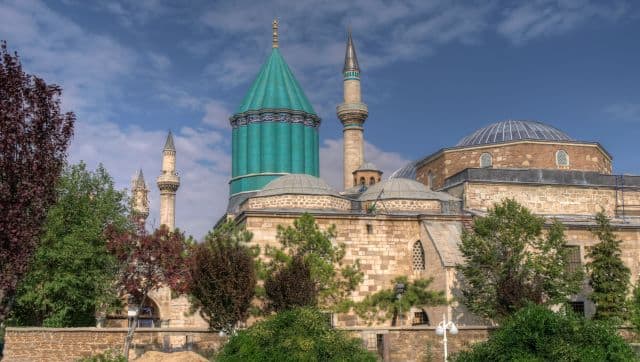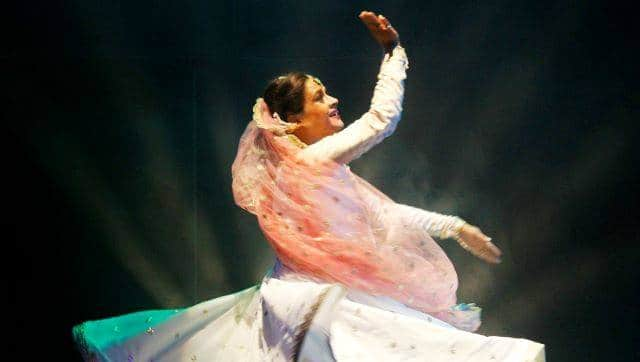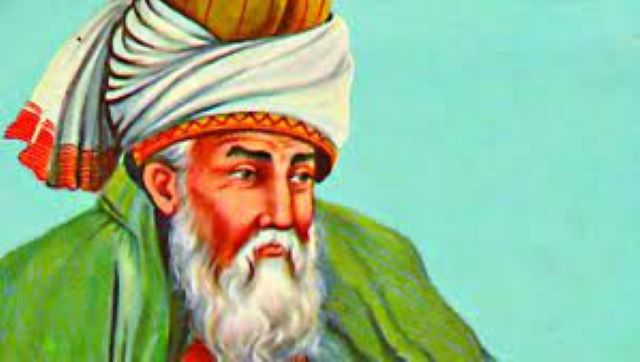Having visited Turkey and many of its interior areas, I did not, however, get to visit Konya, a place of pilgrimage for Mevlevi Rumi admirers. Konya is where he was buried, and where a shrine stands over the burial place. Widely known by the mononym Rumi (30 September, 1207-17 December, 1273), he is also called Jalaluddin Muhammad Rumi or Mevlana (also spelt Mewlana) Celaleddin-i Rumi. He was an Islamic scholar, theologian, poet, saint or spiritual personality, and Sufi mystic. The sobriquet Mevlana or Moulana (Arabic for ‘our master’) is also widely used for him. His works are timeless, and continue to be relevant even though about eight centuries have elapsed since they were composed. Though most of his work is in Persian, he also used Arabic, Greek, and Turkish. A well-known creation is Masnavi, a six-volume philosophical narrative in Persian. His followers founded the Mevlevi (or Mawlawi) order, a mystic branch of Sufism with which the famous whirling dervishes, one of Turkey’s iconic images, are associated. He was born in what is present-day Afghanistan or Tajikistan (there are two versions). Having missed Konya, I finally consoled myself remembering the words on Rumi’s epitaph over there: “When we are dead, seek not our tomb in the earth, but find it in the hearts of men.” [caption id=“attachment_10224001” align=“alignnone” width=“640”]  Melvana Museum in Konya, Turkey[/caption] And indeed Rumi has captured the hearts of countless people over the centuries, and across continents and languages. In the US alone, he is ranked among the most widely read poets. His works are read in the original Persian language as well as hundreds, even thousands perhaps, of translations in different languages by academicians/scholars and poets around the world. Innumerable commentaries on and analyses of his work also exist. Of course, Farrukh Dhondy and other experts has also said that several of the existing translations are not up to the mark. Also, some say that Rumi’s work has been ‘secularised,’ and made less Islamic by certain scholars. Dhondy himself has kept the religious context intact in his own well-received translations. The nuances and beauty of any original can never be rendered fully in translation, some hold. However, this whole debate about ’lost in translation’ and translation-transcreation’ is an endless one, and beyond the scope of this article. And yes, the internet which offers quotes for every occasion is also inundated with badly translated, or worse, fake quotes from Rumi! Such is Rumi’s popularity that his poetry has also been interpreted in dance and music in many cultures and countries. For example, leading Hollywood personalities have paid homage to him in many ways. The spirituality and wisdom of his work, and the emotions of love, longing, friendship, suffering, and devotion they express have a universal appeal. His message of unity and harmony among different people has endeared him to many. Rumi’s spiritual journey has also inspired many artists and academicians. Innumerable commentaries on and analyses of his work also exist. In India, there have been several translations of his poems into regional languages, notably Hindi. Indian classical musicians and dancers as well as Sufi singers have performed to his poetry. Some have used a few of his couplets while others have used longer extracts. Parallels have been drawn between Rumi and our saint-poet Kabir, and Rumi’s work and that of Indian poet Amir Khusro. Indian filmmaker Muzaffar Ali made a documentary on his work. His texts have found expression in Indian dance. These include performances by noted Kathak dancer Shovana Narayan; and dancer and choreographer Tanushree Shankar (in We the Living), to name a few. Many Sufi festivals or cultural events with a Sufi component have featured Rumi in poetry recitations or music and/or dance performances. The survival of Rumi’s work throughout the centuries means it speaks to so many people across countries and cultures. And like every genius, he and his work have lent themselves to interpretation by different people in different ways and contexts. Hence, the many adaptations and productions. For most, Rumi is a symbol of harmony among different faiths and cultures, and a spiritual guide. Some find similarities between Indian Vedantic or other spiritual texts in Rumi’s work. We spoke to a few of these artists and interpreters to find out what draws them to Rumi, and in what specific ways, they gave expression to their admiration. Reputed Delhi-based Kathak dancer and choreographer Rani Khanam has used Rumi poetry verses in her dance performances, and also performed a dance and music production in Delhi, titled An Expression of Mystic Quest with Latif Bolat, a renowned Sufi singer and composer from Turkey. A few years ago, she choreographed a dance production called Shams with differently abled artists. This production was based on Rumi’s poetry, and critically appreciated. She has performed Rumi’s poetry in other Sufi-themed presentations. [caption id=“attachment_10223961” align=“alignnone” width=“640”]  Rani Khamam’s dance inspired by Rumi’s poetry[/caption] Why was she inspired to dance to Rumi’s work? Rani reveals, “What attracted me the most was his philosophy. Rumi firmly believed in the use of music, poetry, and dance as a path to reaching God. The general theme of Rumi’s thought, like that of other mystic and Sufi poets, is essentially the concept of union and oneness with God or a higher force of nature (the primal root) from which/whom one has been cut off and become aloof, and his longing and desire to restore it. I believe Rumi preached about how people of all religions and backgrounds can live together in peace and harmony. Rumi’s thoughts and writings teach us how to reach inner peace and happiness, stop the persistent stream of hostility and hatred towards one another, and achieve global peace and unity.” Dr Balram Shukla, Fellow, Indian Institute of Advanced Study, Shimla, and currently Teaching Faculty, Department of Sanskrit, Delhi University has done much work with Rumi’s output. He has done a firsthand translation of 100 ghazals of Rumi from Persian to Hindi, called Nihshabd Nupur, being the first-ever direct translation of Rumi into Hindi (now in its second edition, Rajkamal Publications, 2021). He has also translated several of Rumi’s ghazals into Sanskrit using the same meters applied by Rumi. Shukla also has several academic research papers showing Rumi’s proximity with Indian thought. What was a Sanskrit teacher doing with Rumi’s work? Shukla replies,
“While pursuing MA in Persian with a special paper on Rumi, I was astonished when I observed a deep resemblance of Rumi’s work with Indian Vedantic thought.
This was an incentive for bringing Rumi into Hindi. Also, Rumi’s ghazals are a rare example of vibrant and true poetry, which is immortal. Innate music and rhythmic resonance, combined with pure divine realisation, make his poetry peerless. Rumi’s poetry for me is like an extension of the Indian ethos.” Well-known Hindustani classical musician and Director, Sunaad (a music collective), Tara Kini tells us of how she saw parallels between ancient Indian philosophy and Rumi. Their music group was inspired to study and sing the Upanishads by Sri M. In 2011, they presented an insight into the Kathopanishad philosophy through an understanding of notes in music, called Swar Katha Upanishad. The music was composed in the Dhrupad genre by the Gundecha Brothers. It was Sri M, equally at home with Sufism as the Upanishads, who suggested the group also sing the verses of Rumi’s Masnavi, which had not been set to Hindustani classical music. “His suggestion that we study the Masnavi, led to our discovery of the resonance of these verses with the shlokas of the Ishopanishad In all, we had 11 poems of Rumi that we presented alongside the 18 shlokas of the Ishopanishad. At first, as we studied the Masnavi, some of the stories seemed bizarre, from our very different cultural context. But when we came upon these 11 verses, matching the Isha shlokas, the resonance was unbelievable. The poetry is highly nuanced and accessible to each seeker at his or her own level.” How did that translate into performance? Tara says, “In 2013, we combined the Isha Upanishad with verses from the Masnavi by Rumi. We studied Rumi’s poetry, and were amazed to find such resonance with the philosophy of the Upanishad. For example, one verse in the Isha says: Yastu sarvāṇi bhūtāni ātmanyevānupaśyati | Sarvabhūteṣu cātmānaṁ tato na vijugupsate || 6 || (He who sees all beings in himself and himself in all beings, does not feel hatred or revulsion).” The equivalent thought that we found in Rumi’s Masnavi, was this beautiful verse titled, ‘The Faithful are One Soul’: The single light of the sun in heaven becomes a hundred as it shines in the courtyards of a hundred houses. But when you remove the walls these scattered lights become one. When these houses, these bodies, lose their walls, the Faithful are but one soul. These Persian verses being sung in Dhrupad was perhaps the first ever instance of such a confluence. We titled it Isha Rumi - Beyond Form. We presented 23 shows of the same. Although we followed the English translation by Philip Dunn, Manuela Dunn Mascetti, and RA Nicholson, we found that there were subtle differences when we studied the text with Mahnoor Zamani, Professor of Urdu and Persian in Bengaluru University." Indeed, eight centuries after his passing, Rumi is still relevant. His works are timeless. They resonate with emotions, concerns, and yearnings which are universal. As Shukla puts it, Rumi advocates oneness of existence which leads to the cessation of hatred, and hence makes love inevitable. Besides this, he delineates divine love embodied in human form. These qualities keep his poetry relevant in every age. For dancer Rani, “His poetry and prose are manifested in the rootedness of the human experience in socio-cultural contexts while indicating the essential unity of human oneness.” Rumi is seen by many as the philosopher, who stressed the unity of mankind irrespective of caste, creed, and geography. That makes him relevant forever, and especially valid in the current times. Aruna Chandaraju is an independent journalist and photographer who contributes to leading Indian publications. She is a travel writer, music and dance critic, translator, and author of the book Forgotten Composers.


)
)
)
)
)
)
)
)
)



